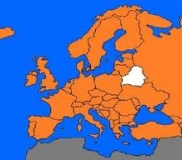Erasmus for All: 5 million in line for EU funding
 Brussels, 23 November 2011 - Up to 5 million people, almost twice as many as now, could get the chance to study or train abroad with a grant from Erasmus for All, the new EU programme for education, training, youth and sport proposed by the European Commission today. Among them would be nearly 3 million higher education and vocational students. Master's degree students would also benefit from a new loan guarantee scheme set up with the European Investment Bank Group. The seven-year Erasmus for All programme, which would have a total budget of €19 billion, is due to start in 2014. See the video.
Brussels, 23 November 2011 - Up to 5 million people, almost twice as many as now, could get the chance to study or train abroad with a grant from Erasmus for All, the new EU programme for education, training, youth and sport proposed by the European Commission today. Among them would be nearly 3 million higher education and vocational students. Master's degree students would also benefit from a new loan guarantee scheme set up with the European Investment Bank Group. The seven-year Erasmus for All programme, which would have a total budget of €19 billion, is due to start in 2014. See the video."Investing in education and training is the best investment we can make for Europe's future. Studying abroad boosts people's skills, personal development and adaptability, and makes them more employable. We want to ensure that many more people benefit from EU support for these opportunities. We also need to invest more to improve the quality of education and training at all levels so we are a match for the best in the world and so that we can deliver more jobs and higher growth," said Androulla Vassiliou, Commissioner for Education, Culture, Multilingualism and Youth.
The Commission's Erasmus for All proposal would allow:
* 2.2 million higher education students to receive grants to spend part of their education and training abroad (compared to 1.5 million under current programmes);
* This figure includes 135000 students getting support to study in a non-EU country, as well as non-EU students coming to study in the Union;
* 735000 vocational students would be able to spend part of their education and training abroad (compared to 350 000 under the current programme);
* 1 million teachers, trainers and youth workers would receive funding to teach or train abroad (compared to 600 000 under current programmes);
* 700000 young people would go on traineeships in companies abroad (compared to 600000 under the current programme);
* 330000 Master's degree students would benefit from loan guarantees to help finance studies abroad under a brand-new scheme;
* 540000 young people would be able to volunteer abroad or participate in youth exchanges (compared to 374000 under the current programme);
* 34000 students would receive grants for a 'joint degree', which involves studying in at least two higher education institutions abroad (this compares to 17 600 supported under the current programme);
* 115000 institutions/organisations involved in education, training and/or youth activities or other bodies would get funding to set up more than 20 000 'strategic partnerships' to implement joint initiatives and promote exchange of experience and know-how;
* 4 000 education institutions and enterprises would form 400 'knowledge alliances' and 'sector skills alliances' to boost employability, innovation and entrepreneurship.
Background
Erasmus for All would bring together all the current EU and international schemes for education, training, youth and sport, replacing seven existing programmes 1 with one. This will increase efficiency, make it easier to apply for grants, as well as reducing duplication and fragmentation.
The Commission is proposing an increase of approximately 70% compared to the current seven-year budget, which would allocate €19 billion to the new programme in 2014-2020. The figure takes account of future estimates for inflation and includes expenditure foreseen for international cooperation.
The new programme will focus on EU added value and systemic impact, with support for three types of action: learning opportunities for individuals, both within the EU and beyond; institutional cooperation between educational institutions, youth organisations, businesses, local and regional authorities and NGOs; and support for reforms in Member States to modernise education and training systems and promote innovation, entrepreneurship and employability.
Two-thirds of the funding would be spent on mobility grants to enhance knowledge and skills.
The streamlined structure of the new programme – together with its significantly increased investment – means the EU will be able to deliver many more opportunities for students, trainees, young people, teachers, youth workers and others to improve their skills, personal development and job prospects. Erasmus for All will also promote research and teaching on European integration, and support grassroots sport.
Since 2007, an average of 400 000 people per year have received EU grants for study, training and volunteering abroad. Under the Commission's proposal, this figure would nearly double to almost 800 000. (In 2010, 560 000 received grants in the 27 Member States, see Annex 1).
Next steps
This proposal is now under discussion by the Council (27 Member States) and the European Parliament who will take the final decision on the budgetary framework for 2014-2020.
For more information: MEMO/11/818, http://ec.europa.eu/. European Commission: Education and Training website.
Annex 1:
Table shows the number of recipients of EU grants for study, training and volunteering under the Lifelong Learning Programme and Youth in Action in 2010. (Erasmus for All will encompass both programmes and aims to nearly double the number of beneficiaries across the EU).
Annex 2:
Proposed funding levels by sector 2014-2020, compared to the 2007-2013 programmes (€ Million, EU-27).
See also: "Erasmus for All", EU sets 20% student mobility target.








/https%3A%2F%2Fprofilepics.canalblog.com%2Fprofilepics%2F1%2F0%2F1076071.jpg)